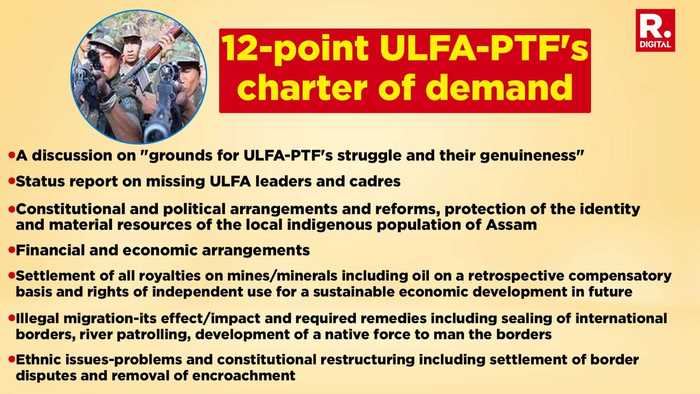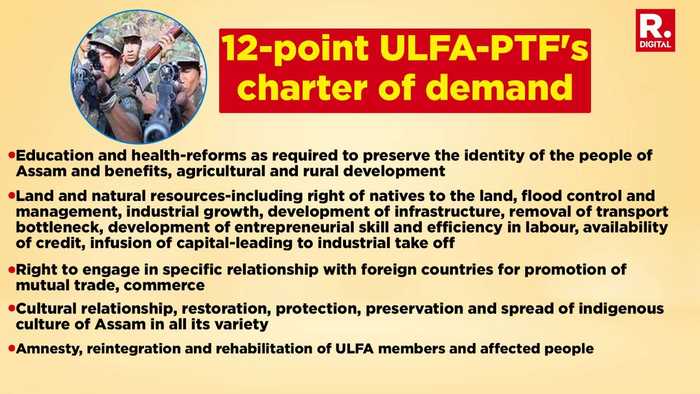Published 11:18 IST, December 29th 2023
ULFA-PTF & Govt sign peace pact today to end decades-long insurgency in Assam: All you need to know
The hardline ULFA faction led by Paresh Baruah is excluded from the peace agreement due to their continued rejection of government goodwill.
- India News
- 4 min read
In a historic milestone aimed at putting an end to the decades-Long insurgency in Assam, a tripartite peace accord will be signed between the pro-talks faction of the United Liberation Front of Asom (ULFA), the central government, and the Assam state government today on Friday, December 29. The signing ceremony to be held in New Delhi, will see Union Home Minister Amit Shah, Assam Chief Minister Himanta Biswa Sarma, and more than a dozen key leaders from the pro-talks faction of ULFA, led by Arabinda Rajkhowa, in attendance.
The accord, termed as an important step towards resolving the longstanding issues, will address concerns including political, economic, and social dimensions specific to Assam. Officials revealed that the agreement extends cultural safeguards and land rights to the indigenous population, along with addressing critical political and economic matters that have plagued the region for decades.
Hardliner ULFA faction under Paresh Baruah not part of the accord
However, it's crucial to note that the hardline faction of ULFA, under Paresh Baruah, is excluded from this agreement as they continued to reject the goodwill extended by the government.
This event shall mark the culmination of efforts that began when the Rajkhowa-led ULFA faction initiated talks with the central government back in 2011, despite opposition from the hardline faction led by Baruah. In 2011, ULFA underwent a division into two factions. The pro-talk faction, under the leadership of Arabinda Rajkhowa, opted to return to Assam from overseas and engage in peace talks. Conversely, the other group, ULFA (Independent), led by Barua, stood in opposition to negotiations unless discussions regarding the 'sovereignty' clause were entertained.
The agreement includes a comprehensive 12-point charter of demands put forth by the pro-talks faction. These demands revolve around crucial aspects, including constitutional and political arrangements, protection of indigenous identities and resources, financial and economic frameworks, and a focus on missing ULFA members, among others.


The ULFA Charter explained in 10 key points
- Cultural preservation and promotion: The accord, as per sources, will highlight the preservation, protection, and promotion of Assam's diverse indigenous cultures, aiming to safeguard their traditions, languages, and heritage.
- Land rights and resources: It would ensure the rightful ownership of land and natural resources to the local indigenous communities, addressing concerns related to land encroachments and facilitating sustainable development initiatives.
- Economic development initiatives: The agreement would also include provisions for comprehensive economic development plans, focusing on job creation, skill development, and entrepreneurship among Assam's youth to foster economic growth.
- Border security and curbing illegal migration: The agreement should also include strategies for strengthening border security, including river patrolling and the development of a dedicated native force, outlined to curb illegal migration and address its impact on the socio-economic fabric of Assam.
- Educational and healthcare reforms: The tripartite agreement might also incorporate reforms in the education and healthcare sectors, ensuring these systems are tailored to preserve the unique identity of Assam's people and provide accessible, quality services.
- Amnesty and reintegration: It also outlines plans for the amnesty, reintegration, and rehabilitation of former ULFA members and affected individuals, aiming for their smooth assimilation into mainstream society.
- Cultural diplomacy: Provision shall be made to facilitate engagements with foreign countries for mutual trade, commerce, and cultural exchanges, promoting Assam's indigenous culture on an international platform.
- Environmental conservation: Strategies for sustainable environmental practices, flood control, and the management of natural resources will also be likely addressed to mitigate ecological challenges faced by the region.
- Infrastructure development: The agreement should also, as per sources, prioritise the development of infrastructure, focusing on transportation networks, industrial growth, and removing bottlenecks to facilitate economic progress.
- Consultative mechanisms: The accord should also include provisions for establishing consultative mechanisms involving representatives from diverse stakeholders, encouraging ongoing dialogue to address emerging challenges and ensure sustained peace and development.
Anticipated impact of the agreement
The peace accord's foundations were laid over years of dialogue and negotiations, with recent rounds of discussions in the national capital involving key representatives from both the ULFA faction and the government. Anup Chetia and Sashdhar Choudhary from the Rajkhowa group, along with government representatives like Intelligence Bureau Director Tapan Deka and Northeast affairs advisor A K Mishra, played important roles in shaping the final agreement.
This breakthrough, as per reports, is expected to pave the way for developmental policies and initiatives tailored to uplift the region, focusing on financial aid packages, to curb issues like illegal immigration, and new land reservation strategies. The core objective remains ensuring the rights and protection of Assam's indigenous communities.
Updated 13:15 IST, December 29th 2023